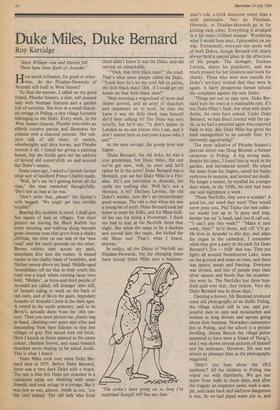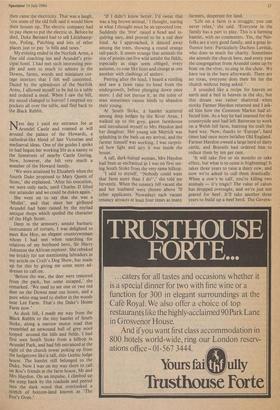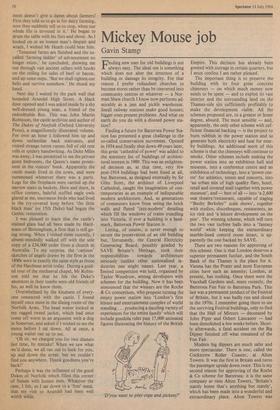Duke Miles, Duke Bernard
Roy Kerridge
`Since William rose and Harold fell There have been Earls of Arundel.' How much influence, for good or other- wise, do the Fitzalan-Howards of Arundel still hold in West Sussex?
To find the answer, I called on my good friend, Phoebe Somers, a slim, self-assured lady with Norman features and a garden full of tortoises. She lives in a small thatch- ed cottage in Poling, a tiny village formerly belonging to the Duke. Every week, in the West Sussex Gazette, Phoebe interviews an elderly country person and illustrates her column with a charcoal portrait. Her sub- jects talk of old times, of carters, wheelwrights and shire horses, and Phoebe records it all. I found her giving a painting lesson, but she kindly gave me the address of several old countryfolk on and around the Duke's estates.
Some years ago, I asked a Cornish farmer what sort of landlord Prince Charles made.
'Well, let's say he's getting better all the time,' the man remarked thoughtfully. `He's not as bad as he was.'
`Don't print that, please!' the farmer's wife begged. 'We might get into terrible trouble!'
Bearing this incident in mind, I shall give few names of men or villages. You must picture me leaving the Black Rabbit Inn every morning and walking along beneath great chestnut trees that grow from a chalky cliffside, the river on one side of the 'new road' and the castle grounds on the other. Brown rabbits dart across my path, moorhens dive into the rushes. A weasel rustles in the chalky bank of brambles, and finches swoop above my head. Middle-aged Arundelians tell me that in their youth this road was a track where running races were held. 'Mullets', as born-and-bred people of Arundel are called, tell stranger tales still, of farmers riding to work on the back of red oxen, and of Bevis the giant, legendary founder of Arundel Castle in the dark ages. A sword in the castle armoury, said to be Bevis's, actually dates from the 14th cen- tury. Then you must picture me, plastic bag in hand, climbing over gates and stiles and descending from bare hilltops to tiny lost villages of grey flint mixed with red brick. Here I knock at doors painted in the estate colour, chestnut brown, and stand beneath thatched eaves hoping to be asked inside. This is what I heard:
`Duke Miles took over when Duke Ber- nard died in 1975. Before Duke Bernard, there was a very dark Duke with a beard. The tale is that this Duke got stranded in a rainstorm while out shooting with some friends, and took refuge in a cottage. But it was just as wet, almost, inside as out, 'cos the roof leaked. The old lady who lived there didn't know it was the Duke, and she carried on remarkable.
"Ooh, that little black man!" she cried. That's what some people called the Duke. "Look how he's let my roof fall to pieces, the little black man! Ooh, if I could get my hands on that little black man!"
`Next morning a wagonload of straw and timber arrived, and an army of thatchers and carpenters set to work. So then she knew it was the little black man himself she'd been talking to! The Duke was very scruffy, but he'd say: "It don't matter in London as no one knows who I am, and it don't matter here as everyone knows who I am!" '
At the next cottage, the gossip level was higher.
`Duke Bernard, the old duke, he was a true gentleman, but Duke Miles, the one we've got now, well, he once said he'd rather be in the army! Duke Bernard was a Howard, you see but Duke Miles is a Fitz- alan. He's not interested in Arundel, the castle nor nothing else. Well he's not a Howard, is he? Duchess Lavinia, the old Duke's widder, now she's an extraordinary good woman. The tale is that when she was a young bit of stuff, Duke Bernard took her home to meet his folks, and his Mum kick- ed her out for being a Protestant. I think she had to stay at the Norfolk Arms that night. But when she came to be a duchess and moved into the castle, she kicked the old Mum out! That's what I heard, anyway.'
In reality, all the Dukes of Norfolk are Fitzalan-Howards, but the changing times have forced Duke Miles into a business- `The strike's been going on so long I'm surprised Scargill still has any hair.' man's role, a brisk democrat rather than a mild paternalist. Nor do Fitzalans, Howards, or Fitzalan-Howards go in for kicking each other. Everything is arranged in a far more civilised manner. Wondering what I would hear next, I proceeded on my way. Fortunately, everyone else spoke well of both Dukes, though Bernard will clearly always hold a special place in the affections of his people. The dowager, Duchess Lavinia, shares his popularity, and was much praised for her kindness and work for charity. Those who were now outside the Duke's territory wished that they were in again. A fairly prosperous farmer echoed the complaint against the new Duke: `Things are not so easy now. Duke Ber- nard kept the rents at a reasonable rate. It's not Duke Miles's fault, but what with death duties, the rents have soared. Under Duke Bernard, we had direct contact with the cas- tle, as he had a personal agent who reported back to him. But Duke Miles has given the land management to an outside firm. It's extremely aggravating!'
The most talkative of Phoebe Somers's portrait sitters was Doug Binsted, a former carpenter of Poling. A big strong man, despite his years, I found him at work in the garden, and introduced myself. He wiped the loam from his fingers, raised his bushy eyebrows in surprise, and invited me inside. No longer a tenant, he recalled his younger days when, in the 1920s, his rent had been one and eightpence a week.
`Those Norfolks, they were a wonder! A good lot, my word they were! They would never press you. Phil Taylor the rent collec- tor would trot up in 'is pony and trap, bowler hat on 'is head, and you'd call out, "I can't pay this week!" "Make it next week, then!" he'd shout, and off `e'd go. He lives in Arundel to this day, and plays the organ in the cathedral. I remember when they give a party in the park for Duke Bernard's 21st — 1929 that was. They put lights all around Swanbourne Lake, some on the ground and some on trees, and there was sports, music and feasting. Everyone was invited, and lots of people kept their silver spoons and bowls that the strawber- ries were in. The Norfolks lost three hun- dred quid over that, they reckon. Very shy Duke Bernard was in those days.'
Opening a drawer, Mr Binstead produced some old photographs of an idyllic Poling, the village school still in use, and pur- poseful men in caps and moustaches and women in long dresses and aprons going about their business. Nowadays commuters live in Poling, and the school is a private dwelling. Jimmy Barton the village potter appeared to have been a friend of Doug's, and I was shown several pictures of himself and his assistants. However, life was not always as pleasant then as the photographs suggested.
`Didn't you hear about the 1912 epidemic? All the children in Poling was wiped out with diphtheria. We got our water from wells in those days, and after the tragedy an inspector came, took a sam- ple, and came back and said how dangerous it was. So we had piped water put in, and
then came the electricity. That was a laugh, 'cos some of the old folk said it would blow their houses up. The electric company had to pay them to put the electric in. Before he died, Duke Bernard had to sell Littlehamp- ton, Poling, Patching and lots of other places just to pay 'is bills and taxes.'
My evening ended in the Norfolk Arms, a fine old coaching inn and Arundel's prin- cipal hotel. I had met such interesting peo- ple and seen so much to admire in the Downs, farms, woods and miniature cot- tage interiors that I felt well contented. Dazed by the splendours of the Norfolk Arms, I allowed myself to be led to a table and ordered a meal. When I saw the bill, my mood changed to horror! I emptied my pockets all over the table, and fled back to the Black Rabbit.
Next day 1 paid my entrance fee at Arundel Castle and roamed at will around the palace of the Howards, a
cathedral-like blend of late Victorian and mediaeval ideas. One of the guides I spoke to had begun her working life as a nanny to the Somersets of nearby Castle Goring. Now, however, she felt very much a member of the Howard family.
`We were attainted by Elizabeth when the fourth Duke proposed to Mary Queen of Scots,' she explained. 'After his execution, we were only earls, until Charles II lifted our attainder and we could be dukes again.' She went on to say that she was a `Mullet', and that since her girlhood Arundel had been ruined by the myriad antique shops which spoiled the character of the High Street.
Deep in the armoury, amidst barbaric instruments of torture, I was delighted to meet Ros Hoy, an elegant countrywoman whom I had met when searching for relatives of my boyhood hero, Sir Harry Johnston the African explorer. She rebuked me briskly for not mentioning labradors in my article on Cruft's Dog Show, but made up for this by giving me some more ad- dresses to call on.
`Before the war, the deer were removed from the park, but some escaped,' she remarked. 'We used to see one or two red deer on the Downs near our house, and a pure white stag used to shelter in the woods near Lee Farm. That's the Duke's Home Farm now.'
As dusk fell, I made my way from the Black Rabbit to the tiny hamlet of South Stoke, along a narrow motor road that resembled an unwound ball of grey wool looped around the hills and fields. I had first seen South Stoke from a hilltop in Arundel Park, and had felt entranced at the sight of the church tower poking up from the hedgerows like'a tall, thin Gothic lodge house. The hamlet still belonged to the Duke. Now I was on my way there to call on Ros's friends at the farm house, Mr and Mrs Haydon. On an impulse, I climbed up the steep bank by the roadside and peered into the dark wood that overlooked a stretch of bottom-land known as 'The Fox's Oven.' `If I didn't know better. I'd swear that was a big brown animal,' I thought, staring at what I thought must be an uprooted tree. Suddenly the 'tree' raised a head and in- quiring ears, and proved to be a red deer hind. As I approached, it danced away among the trees, showing a round orange tail-patch. It seems strange that animals the size of ponies can live wild amidst the fields, especially as stags seem obliged, every autumn, to roar like lions and charge at one another with clashings of antlers.
Peering after the hind, I heard a rustling and saw a fawn raise its head from the undergrowth, before plunging down once more. I did not pursue it, as the scent of man sometimes causes hinds to abandon their young.
At South Stoke, a hamlet scattered among deep hedges by the River Arun, I walked up to the grey, gaunt farmhouse and introduced myself to Mrs Haydon and her daughter. Her young son Merrick was splashing in the bath on my arrival, and the farmer himself was working. I was surpris- ed how light and airy it was inside the house.
A tall, dark-haired woman, Mrs Haydon had been as enchanted as I was on first see- ing South Stoke from the very same hilltop.
`I said to myself, "Nobody could want that farm more than I do",' she told me fervently. When the tenancy fell vacant she and her husband were chosen above 70 other applicants. Nowadays each vacant tenancy attracts at least four times as many farmers, desperate for land.
`Life on a farm is a struggle, you can never relax,' she said. 'Everyone in the family has a part to play. This is a farming hamlet, with no commuters. Yes, the Nor- folks are a very good family, and a great in- fluence here. Particularly Duchess Lavinia, who does so much for charity. Sometimes she attends the church here, and every year the congregation from Arundel come up by boat on the river, to sing in the choir. We have tea in the barn afterwards. There are no rotas, everyone does their bit for the church without being asked.'
It sounded like a recipe for heaven on earth and a bed in heaven in the sky, but this dream was rather shattered when stocky Farmer Haydon returned and I ask- ed him how the Common Market had af- fected him. As a boy he had yearned for the countryside and had left Battersea to work on a Welsh hill farm, learning his craft the hard way. Now, thanks to 'Europe', hard times had once more befallen Old England. Farmer Haydon owned a large herd of dairy cattle, and Brussels had ordered him to reduce them by ten per cent.
'It will take five or six months to take effect, but what is to come is frightening! It takes three years to raise a dairy cow, and now we're asked to cull them drastically. When a cow's in calf, you're killing two animals — it's tragic! The value of calves has dropped overnight, and we're just not geared for beef. It'll take another three years to build up a beef herd. The Govern- ment doesn't give a damn about farmers! First they told us to go in for dairy farming, now they suddenly tell us to stop, when our whole life is invested in it.' He began to drum the table with his fists and shout. As I looked on at an honest man's despair and wrath, I wished Mr Heath could hear him.
`Tenanted farms are finished and the so- called 'farming ladder' of advancement no longer exists,' he concluded, showing me out through vast ancient cellars with hooks on the ceiling for sides of beef or bacon, and up some steps. 'But we shall tighten our belts and survive somehow.' He shook my hand.
Next day I waited by the park wall that bounded Arundel High Street. A black door opened and I was asked inside by a shy well-dressed young man, a friend of the redoubtable Ros. This was John Martin Robinson, the castle archivist and author of The Dukes of Norfolk (Oxford University Press), a magnificently illustrated volume. For over an hour I followed him up and down unfamiliar back staircases, and visited strange turret rooms full of old rent rolls in spidery handwriting. As Duke Miles was away, I was permitted to see the private guest bedrooms, the Queen's name promi- nent in the visitors' book. Apparently the castle maids lived in the town, and were summoned whenever there was a party. Logs for the fireplaces were carried up the narrow stairs in baskets. Here and there, in office corners, baleful stuffed eagle owls glared at me, enormous birds who had lived in the ivy-covered keep before 'the little black man' (or 15th Duke) had begun the Gothic restoration.
I was pleased to learn that the castle's stained glass had all been made by Hard- mans of Birmingham, a firm that is still go- ing strong. When I visited them recently, I absent-mindedly walked off with the sole copy of a £34,000 order from a church in Australia. To my surprise. the 'cartoon' sketches of angels drawn by the firm in the 1890s were in exactly the same style as those of the Hardman artist today. During a guid- ed tour of the mediaeval chapel, Mr Robin- son told me that he felt the Duke's ancestors in their tombs were old friends of his, so well he knew them.
Overwhelmed by the kindness of every- one connected with the castle, I found myself once more in the dining room of the Norfolk Arms. The head waiter looked at my ragged tweed jacket, which had once come off worst in an argument with a dog in Somerset, and asked if I wished to see the menu before I sat down. All at once, a young waiter ran up to me.
'Oh sir, we charged you for two dinners last time, by mistake! When we saw what we'd done, we all ran out to look for you, up and down the street. but we couldn't find you anywhere. Thank goodness you're back!'
Perhaps it was the influence of the good Dukes of Norfolk which filled this corner of Sussex with honest men. Whatever the case, I felt, as I sat down to a 'free' meal, that my visit to Arundel had been well worth while.
















































 Previous page
Previous page